Ever felt that mid-afternoon slump where even simple tasks seem hard? It’s common. Many of us face energy dips that make our days feel too much. Eating for energy is more than just food; it’s about fueling our bodies right.
Our diet greatly affects our energy and health. It plays a key role in how we feel all day. By learning about nutrition for energy, we can boost our vitality and enjoy our days more.
In this article, we explore how to eat for energy and stay energized. It’s about making choices that help us feel our best. Every decision, from what we eat to when we eat, matters. It’s about giving our bodies what they need to perform at their best12.
Key Takeaways
- Eating frequently helps maintain normal blood sugar levels, preserving muscle tissue.
- Complex carbohydrates provide slow-releasing energy, stabilizing our blood sugar.
- Healthy fats, protein, and complex carbohydrates together promote sustained energy.
- Staying hydrated with an intake of 6 to 8 cups of water daily supports energy levels.
- Small, healthful meals can increase energy and aid in weight management.
The Importance of Nutrition in Energy Levels
The importance of nutrition is huge, and it’s key for our energy levels. Eating right keeps us full of life and ready to go. Good food is essential for our health, affecting how we feel and think.
Research shows that what we eat adds up to 10%-15% of our daily energy use3. This means our diet plays a big role in how much energy we have. Eating foods that are full of nutrients but low in calories can boost our health.
Eating a mix of colorful veggies and whole grains helps our energy and cuts disease risk4. We should choose lean meats and other protein sources to keep fat intake down. Changing our diet can help us recover faster and live better through healthy eating.
Learning to eat healthily is key to using nutrition to our advantage. What we eat affects our energy, showing how big of a role nutrition plays in our lives.
Understanding Calories: Quality versus Quantity
When we talk about understanding calories, it’s key to know the difference between quality and quantity. Calories give us energy, but not all are good for us. An active male might need 3,000 kcal a day, while an active female might need 2,400 kcal daily5.
It’s important to think about where our calories come from. Foods like veggies, whole grains, fruits, nuts, and yogurt are good for losing weight6. On the other hand, foods like potato chips, sugary drinks, and processed meats can lead to weight gain6.
A balanced diet for energy includes many nutrient-rich foods. We should avoid foods with empty calories, like solid fats and added sugars. Over half of Americans drink sugary drinks daily, making them a big source of added sugars in our diet5.
To stay healthy and have enough energy, we should choose quality over quantity in our food. Focusing on the quality of calories we eat can greatly improve our health and energy levels. Let’s see how we can make these changes in our daily lives.
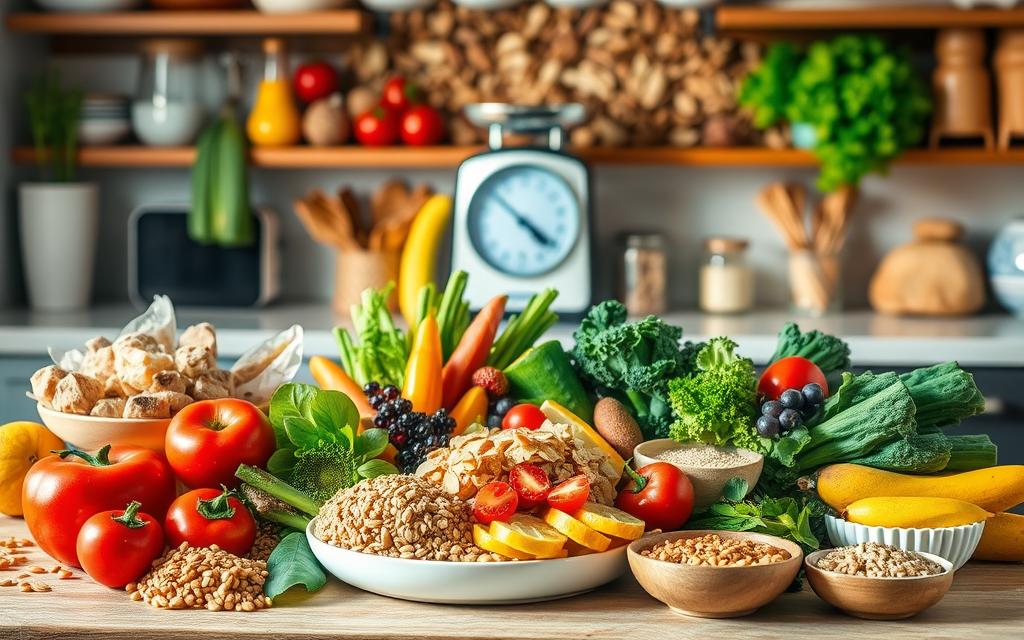
Filling versus Fueling Your Body
Knowing the difference between filling versus fueling is key for managing energy. Processed foods might fill our bellies but lack vital nutrients. This can cause energy crashes, hurting our daily tasks. We should focus on nutrient-dense foods that keep us full and nourish us well.
Nutrient density means how many nutrients a food has per calorie. Foods rich in vitamins, minerals, and good stuff are better than those that aren’t7.
Good nutrient-dense foods include fruits, veggies, whole grains, and lean proteins. But, we should eat less of foods like processed snacks7. A balanced diet boosts our health, mood, and energy7.
When we eat matters too. Eating two hours before exercise is best for performance. After working out, carbs like whole-grain pasta help refill energy, within 30-60 minutes8. Healthy fats from avocados and nuts also boost energy for long activities8.
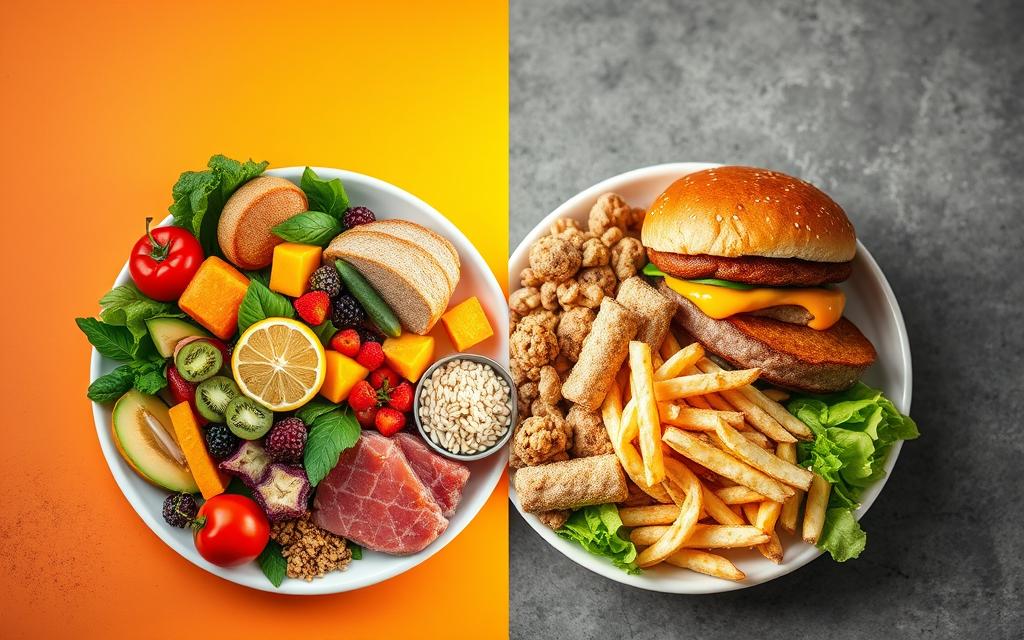
Eating for Energy: Nutrient-Dense Foods
Nutrient-dense foods are key to fueling our bodies well. They are packed with vitamins and minerals but have fewer calories. This helps keep our energy up all day. By eating these foods, we support our health and energy.
Types of Nutrient-Dense Foods
We have many nutrient-dense foods to choose from. Each one offers special benefits:
- Fruits: Berries, apples, and bananas give us antioxidants and energy for better performance.
- Vegetables: Leafy greens like kale are low in calories but full of vitamins and minerals. For example, a cup of kale has just 9 calories but lots of vitamins C, A, K, and B6, plus potassium and calcium9.
- Whole grains: Foods like brown rice and oatmeal keep our energy up because of their fiber. This makes us feel full and avoids energy crashes10.
- Lean proteins: Foods like wild Atlantic salmon are great for muscles and energy. A 100-gram serving has about 25.4 grams of protein9.
- Healthy fats: Foods like dark chocolate (70-85% cocoa) are full of antioxidants. They support heart health and give us energy10.
Incorporating Nutrient-Dense Foods into Your Diet
Adding nutrient-dense foods to our meals is easy and fun:
- Begin with a breakfast that has fruits or whole grains, like oatmeal with berries.
- Make hearty salads with many vegetables, including leafy greens and protein-rich foods like chickpeas or nuts.
- Choose protein-rich snacks, like sardines or boiled eggs, to stay full without too many calories.
- Switch to whole grains like quinoa or brown rice in your meals for more nutrients.
Learning about and using nutrient-dense foods leads to better health and more energy in our busy lives.
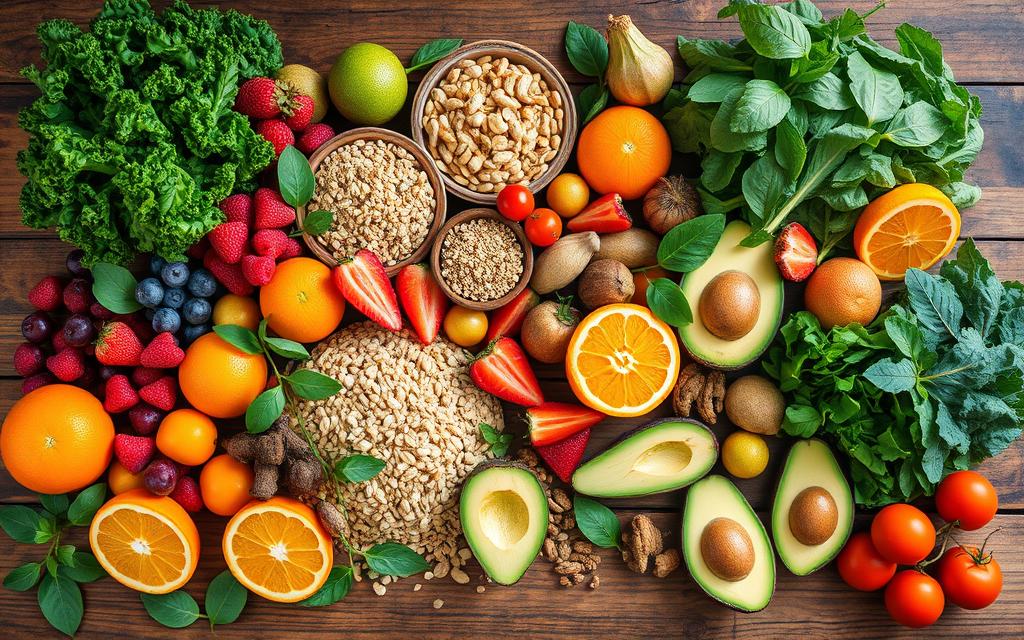
Healthy Eating Habits to Maintain Energy
To keep our energy up all day, we need to eat well. Starting with a good breakfast is key.
The Role of Breakfast in Energy Maintenance
Breakfast is our first chance to refuel after sleep. Eating protein in the morning boosts our energy and metabolism. This improves our focus and stamina11.
Eating a balanced breakfast sets the stage for a day of energy. It’s a crucial part of our daily routine.
Structuring Meals and Snacks for Consistent Energy
To keep our energy steady, we should plan our meals and snacks. Eating protein, fiber, and healthy fats every three to four hours is key. This keeps our blood sugar stable and prevents energy drops11.
Eating at least five portions of fruits and veggies a day is also good for nutrition12. Here’s a table with tips for meal planning:
| Time | Meal/Snack | Key Nutrients |
|---|---|---|
| 8:00 AM | Breakfast | Oatmeal with berries and nuts |
| 10:30 AM | Snack | Yogurt with fruit |
| 12:30 PM | Lunch | Grilled chicken salad with olive oil |
| 3:00 PM | Snack | Hummus with carrot sticks |
| 6:00 PM | Dinner | Baked salmon with quinoa and steamed broccoli |
Focus on Complex Carbohydrates
Understanding complex carbohydrates is key to keeping our energy up. They digest slowly, giving us a steady flow of energy. This is different from simple sugars, which can cause energy spikes and drops. Adding complex carbs to our diet helps us stay energized all day.
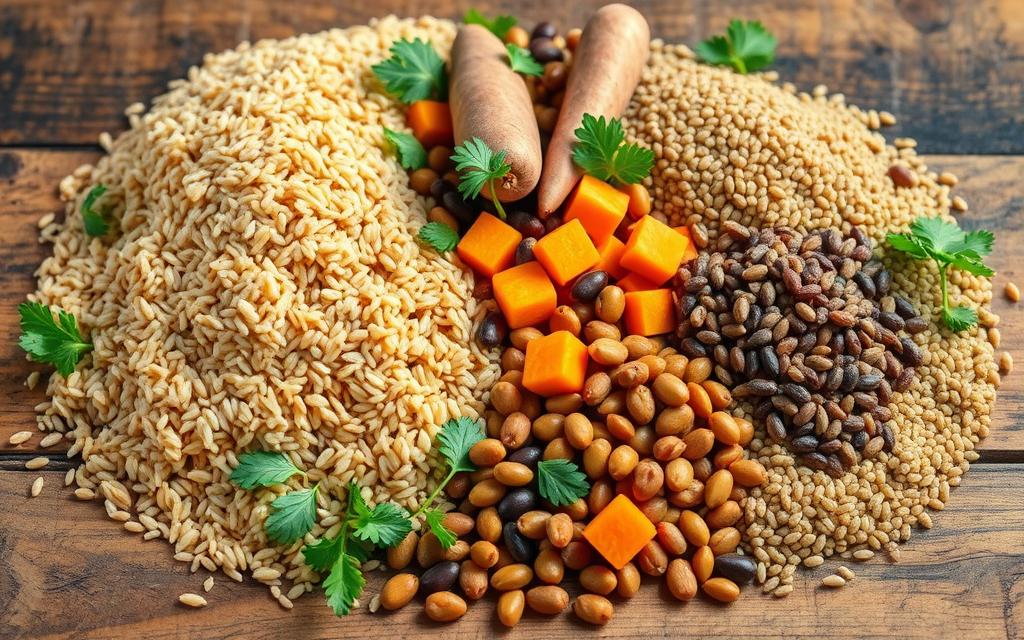
We need complex carbs to make up 45-65% of our calories. Eating a variety of whole grains, fruits, and veggies is best. These foods are full of fiber and nutrients. For example, pregnant women should eat lots of complex carbs, like 6 ounces of grains and cereals in the first trimester, increasing to 8 or 9 servings later13.
Choose whole grains over refined ones. Foods like barley, lentils, chickpeas, and quinoa are great. They give us energy and help us meet our daily fiber goal of 25-30 grams14 and15.
Adding snacks like nuts, Greek yogurt, or edamame to our diet is a good idea. Whole fruits are better than fruit juices because they keep us full longer14. Sweet potatoes and whole wheat products give us energy without the crash of refined sugars.
| Complex Carbohydrate Sources | Benefits |
|---|---|
| Whole Grains (Quinoa, Brown Rice) | Rich in fiber and B vitamins, providing sustained energy. |
| Legumes (Lentils, Chickpeas) | High in fiber, protein, and can lower cholesterol. |
| Root Vegetables (Sweet Potatoes) | Slow-releasing carbohydrates for long-lasting energy. |
| Fruits (Berries, Apples) | High in fiber, vitamins, and minerals, promoting overall health. |
| Nuts and Seeds | Provide healthy fats, fiber, and protein for energy. |
The Power of Protein for Sustained Energy
Protein is key to keeping our energy up all day. It helps us build muscle and use energy well. A study showed that eating more protein made people feel full longer16.
Nutrition experts say we need about 0.5 grams of protein for every pound of body weight. So, a 160-pound person should eat at least 80 grams of protein each day. Adding lean meats, beans, and dairy to our meals helps us stay energized.
Protein intake affects our energy levels. Even though we eat more, our energy stays the same. This is because protein helps control hunger16. It also keeps blood sugar stable, avoiding the energy crashes from carbs17.
Eating a mix of protein-rich foods boosts our energy. This makes it easier to stay active. It also helps us feel good all day, thanks to healthy eating habits.
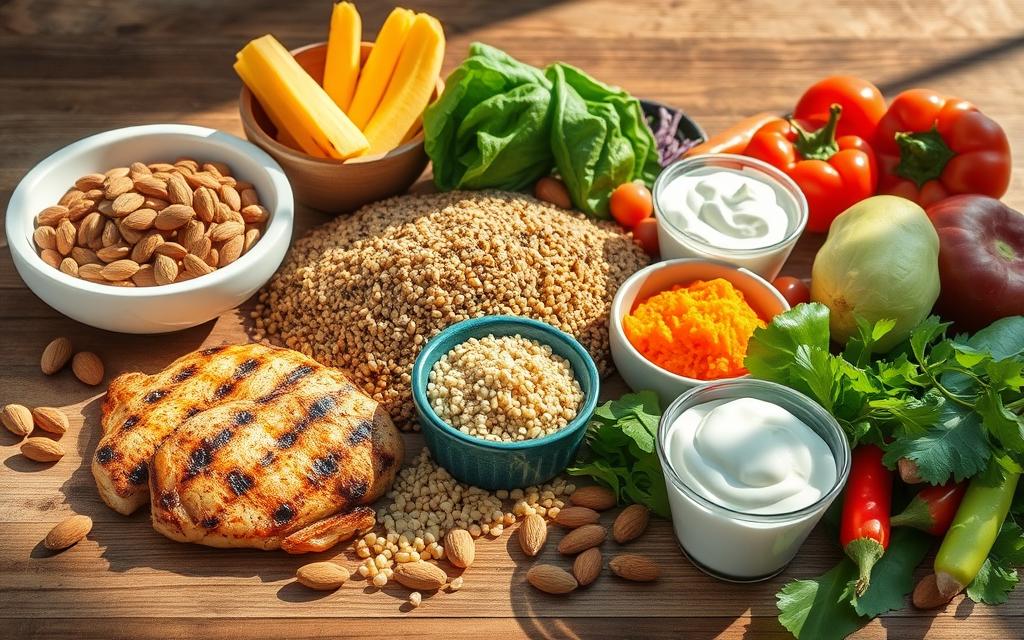
Incorporating Healthy Fats into Your Diet
Healthy fats are key to a balanced diet for energy. They fuel our bodies and boost overall wellness. Foods like avocados, nuts, and olive oil are rich in healthy fats. They help lower heart disease risk and improve cholesterol levels18.
We should aim to get 20% of our daily calories from healthy fats19. This helps support good cholesterol and reduces heart disease risk19. Eating fatty fish like salmon and tuna daily is also crucial for heart health18.
To see which healthy fats we should eat, check out the table below:
| Type of Healthy Fat | Sources | Benefits |
|---|---|---|
| Monounsaturated Fat | Olive oil, avocados, nuts | Lowers bad cholesterol, reduces heart disease risk |
| Polyunsaturated Fat | Fatty fish, flaxseeds, walnuts | Supports brain health, reduces inflammation |
| Omega-3 Fatty Acids | Salmon, mackerel, chia seeds | Improves heart health, lowers blood pressure |
It’s important to watch our fat intake. Many people don’t get enough healthy fats, showing we need to eat better18. Choosing healthy fats for our meals can lead to a more energetic and healthy life.
Hydration and Its Impact on Energy Levels
Drinking enough water is key to keeping our energy up. Our bodies are about 60% water, showing how important it is for our health20. We’re often told to drink eight 8-ounce glasses a day, known as the 8×8 rule20.
Even a little dehydration can make us tired. Losing just 2% of our body’s water can make us feel fatigued20. Athletes can lose up to 6–10% of their body weight in sweat during intense workouts20.
Drinking enough water helps us think clearly and perform better. Losing 1–3% of our body’s water can hurt our brain function a lot20. For example, losing 1.4% after working out can make us feel less focused and in a bad mood20.
Choosing water over sugary drinks is better for our energy intake. Drinking water instead of sugary drinks before meals can increase our total energy intake by 7.8%21. On the other hand, drinking water can help with weight loss. People who drank 16.9 ounces of water before meals lost 44% more weight in 12 weeks than those who didn’t2021.
The link between staying hydrated and having more energy is clear. Drinking enough water, along with eating foods high in water, helps us perform better. Making hydration a regular part of our lives can greatly improve our energy and overall health. Adding these habits to our daily routine can make our lives better.
Meal Prep for Energy: Planning for Success
Meal prep is key to healthier eating. It helps us avoid quick, high-calorie meals that can lead to weight gain22. By planning ahead, we can save up to 20% on groceries, making our choices both nutritious and budget-friendly22.
Preparing meals before we shop helps us avoid impulse buys. Without a list, 60% of people overspend and waste food23. By planning, we can cut food waste by up to 30%23. This not only saves money but also helps us eat healthier, consuming up to 30% fewer calories2223.
Storing food properly is crucial for keeping it fresh. Items like hard-boiled eggs and chopped veggies stay good for a week in airtight containers. Soups and stews can last 2-3 months in the freezer22. Meal prep saves us 2-3 hours a week, reducing stress and decision fatigue by 30%2223.
Energy-Boosting Recipes to Try
We’re on a mission to boost our energy with tasty and simple recipes. Quick breakfasts and healthy snacks keep us going all day. Let’s explore some great ideas to energize and satisfy us.
Quick Breakfast Options
Starting the day with the right foods is key. Try a creamy avocado toast with seeds for a healthy fat boost. Use whole-grain bread for lasting energy. Oatmeal with nuts and fruits is also a great choice, offering fiber and protein to keep us full.
Nutritious Snacks for Sustained Energy
Having healthy snacks on hand is crucial for our energy. Chickpea salad sandwiches are a tasty, protein-rich option for a midday pick-me-up24. A veggie platter with creamy hummus is another energizing snack25. Simple snacks like roasted sweet potatoes or overnight oats are full of complex carbs and fiber, keeping us focused26
| Recipe | Main Ingredients | Energy Benefits |
|---|---|---|
| Chickpea Salad Sandwich | Chickpeas, whole grain bread, veggies | Plant-based protein, fiber |
| Avocado Toast | Avocado, whole grain bread, seeds | Healthy fats, fiber |
| Vegetable Hummus Dip | Avocado, chickpeas, assorted veggies | Vitamins, healthy fats |
| Overnight Oats | Oats, nuts, fruits | Complex carbs, protein |
| Roasted Sweet Potatoes | Sweet potatoes, spices | Complex carbohydrates |
By trying these energy-boosting recipes, we can keep our bodies fueled and our minds sharp all day242625.
Natural Energy Sources: Foods to Embrace
Looking for energy and health? Whole foods, fruits, and veggies are key. Foods like bananas, oats, and nuts give us energy and keep it steady. Bananas have B vitamins and fiber, helping turn carbs into energy. Oats give a lasting energy boost because of their vitamin B2728.
Here are some foods to add to your diet for more energy:
| Food | Benefits |
|---|---|
| Bananas | Rich in B vitamins and potassium, excellent for muscle function and pre-workout energy |
| Oats | Sustainable energy boost from complex carbohydrates, stabilizing blood sugar levels |
| Nuts | Provide protein, healthy fats, and fiber, essential for maintaining energy levels |
| Lentils | Great source of fiber and complex carbohydrates, supplying steady energy |
| Dark Chocolate | High in antioxidants and may elevate energy levels with its caffeine content |
| Leafy Greens | Contain vitamins that balance energy levels and improve sustainability |
Adding these foods to your diet can fight off tiredness. Leafy greens like spinach are packed with nutrients and help keep energy up all day29. Nuts, like almonds, offer healthy fats and magnesium for steady energy2729.
By eating different natural energy sources every day, we can stay full of energy. This boosts our health and lets us live more actively.
Conclusion
Understanding how our food choices affect our energy is key to feeling better and staying healthy. Eating foods rich in nutrients like fruits, veggies, whole grains, and lean proteins boosts our energy. It also helps us eat fewer calories than processed foods.
Bad eating habits, like eating at odd times, can lead to obesity and diabetes. This shows how important our food choices are30.
Drinking enough water and planning meals ahead helps us make better food choices. A regular eating schedule, with whole, balanced meals, lowers the risk of heart disease and high blood pressure. Sticking to healthy eating habits greatly improves our energy and health31.
By adopting these habits, we can do our best every day. A mindful diet not only energizes us but also builds long-term health. Let’s keep making better food choices for our energy and well-being.
FAQ
What are some energy-boosting foods I can include in my diet?
Eating fruits, vegetables, whole grains, lean proteins, and healthy fats can boost your energy. Try bananas, oats, nuts, and avocados for a natural energy boost.
How does hydration affect my energy levels?
Drinking enough water is key to keeping your energy up. Dehydration can make you feel tired and less energetic. So, drink plenty of water and eat hydrating foods like fruits and veggies.
Why are complex carbohydrates important for energy?
Complex carbs like whole grains and legumes give you energy slowly. They help keep your blood sugar stable, giving you energy for longer than simple sugars do.
What is nutrient density, and why does it matter?
Nutrient density is how much nutrition a food has compared to its calories. Eating foods high in nutrients but low in calories is important for energy. It helps you get the vitamins and minerals you need without too many calories.
How can meal prep contribute to better energy levels?
Meal prep lets you plan and make healthy meals ahead of time. This makes it easier to eat well even when you’re busy. It helps keep your energy levels steady all week.
What role does protein play in maintaining energy?
Protein helps keep your muscles strong and makes you feel full longer. Eating protein-rich foods like lean meats, beans, and dairy can help keep your energy up. This is because your body uses more energy to digest protein.
Can eating fats actually boost my energy?
Yes, healthy fats are important for energy and overall health. They help your body make energy and absorb nutrients. Foods like nuts, seeds, avocados, and fatty fish are great for keeping your energy up.
How often should I eat to maintain energy levels?
Eating every three to four hours is good for keeping your energy steady. It helps prevent big drops in energy throughout the day.
